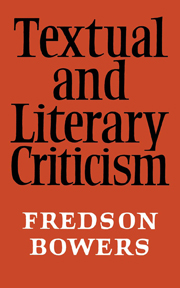III - The New Textual Criticism of Shakespeare
Published online by Cambridge University Press: 15 September 2009
Summary
I have suggested that problems present themselves to the biblio-textual critic in three main categories: the analysis of an extant manuscript; the recovery of the characteristics of a lost manuscript; and the analysis of authority in the history of textual transmission.
With the possible exception of some lines in Sir Thomas More of which the status is in doubt, no manuscript by Shakespeare has come down to us. Hence Shakespearean textual criticism must concern itself exclusively with problems of recovery and of transmission. I do not intend any implication that the textual critic of Shakespeare can be indifferent to those manuscripts of contemporary plays that have been preserved, and to their characteristics, for these will serve as the basis for hypotheses about the forms of the lost Shakespearean papers. All I mean is that, wanting any certain example of Shakespearean manuscript material, the critic has nothing tangible to analyse.
We must always keep one thing firmly in mind. Ultimately, textual inquiry comes to rest on the authentication of every individual word in every Shakespeare play as—on the available evidence—what we may believe to be the very word written by Shakespeare. On the available evidence, most of the individual words can be so authenticated. Other individual words seem to any common-sense literate view manifestly either wrong or else to be such errors as to constitute no words at all. These are clearly in need of emendation. A third range of individual words has evoked suspicion.
- Type
- Chapter
- Information
- Textual and Literary Criticism , pp. 66 - 116Publisher: Cambridge University PressPrint publication year: 1959



